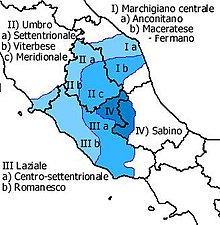Marchigiano
| Marchigiano | |
|---|---|
| Marchigià | |
| Native to | Italy |
| Region | central Marche (provinces of Ancona, Macerata and Fermo) |
|
Native speakers
|
900,000 (date missing) |
|
Indo-European
|
|
| Language codes | |
| ISO 639-3 | – |
|
Linguist list
|
ita-cen |
| Glottolog | None |
| Linguasphere | 51-AAA-okl & 51-AAA-rba |
 |
|
Marchigiano refers to a tight cluster of local Romance speech types spoken in the central part of the region Marche, in Italy, in a zone which includes the provinces of Ancona, Macerata and Fermo. It is one of the Central Italian dialect types, and forms part of the typological continuum with Umbrian dialects and Tuscan. There are notable grammatical, lexical and idiomatic differences between Marchigiano and standard Italian language, but it is generally considered, along with the rest of Central Italian dialects, rather intelligible for a speaker of Standard Italian.
In itself Marchigiano is not uniform from town to town, being divided in two main areas:
The three areas of the Marchigiano dialect are united by some common features which distinguish the dialect from the others central Italian languages :
The conjugation of to be and to have got at the present indicative tense in the two main dialects is as follows :
The dialect of Ancona is spoken in the region of the town of Ancona, Porto Recanati, Loreto, Osimo, Jesi, Chiaravalle and Falconara. Particularly this dialect's speakers always use the articles el (the male singular, Italian il) unlike standard Italian which in some cases uses lo (the male singular). Only the speakers of the towns which are closer to Macerata (Osimo, Castelfidardo, Loreto, Porto Recanati) use the article lo as in Italian. These cities also undergo other influences from Macerata's dialect because they are closer to it.
The dialect of Fabriano is spoken in the town of Fabriano (closer to Umbria) and in the towns closer to it. Rhotacism occurs in this dialect (calza (sock) > carza, fulmine (lightning) > furmine).
...
Wikipedia
